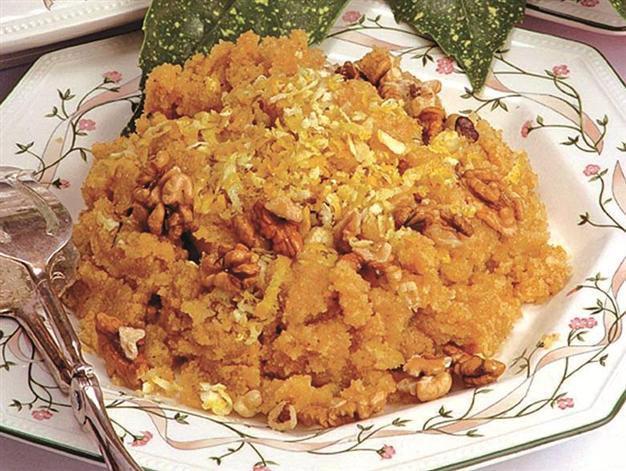Ascending like a dove
AYLİN ÖNEY TAN - aylin.tan@hdn.com.tr

Semolina helva has always been associated
with funerals in Anatolia; both Armenians
and Turks prepare after funerals.
Jan. 19 was the sixth anniversary of the killing of journalist Hrant Dink in a vicious assassination. Crowds filled the streets of Osmanbey around the office of the Armenian-Turkish language newspaper Agos, of which Dink was the key founder and editor-in-chief.
According to one Armenian belief, a pure soul is like a dove, and after death the dove flies off to a better world. Armenians believe that the souls of sinners get heavy with the burdens of this world and the sinister spirits darken - turning as black as a piece of charcoal. The imagery of a bridge is highly symbolic for many of the people of this geography. There is a bridge as frail as a thread of hair leading to paradise, and souls saddled with sins are too heavy to cross to the other side. Falling to the never-extinguishing fire underneath the thinnest of bridges is inevitable for the evil; but good souls are able to make their way as if flying away like a dove. Like angels without wings, good spirits fly to the eternal land of peace.
This last voyage, the passage to heaven, is not rushed. It takes seven days. Therefore, the good spirit does not just disappear, but it hangs around the house. The family gives a meal to friends, relatives and neighbors. At the table, where all loved ones are gathered, remembrance brings the deceased back to life. This meal is called the “bread of life,” or “soul bread,” which is “hokehats” in Armenian.
Another ritual performed after somebody’s death is to prepare helva. Semolina helva is always associated with funerals in Anatolia; both Armenians and Turks prepare this dessert after their funerals. “Helva” is originally an Arabic word, simply meaning “sweet.” Helva is also prepared on the day of Merelots, the Remembrance Day of the Dead. Relatives of the dead visit graves, and at home they make the traditional helva, taking turns to stir the semolina while praying for the souls of the loved ones. All Soul’s Day is a mourning day, but it also contains joy - celebrating life through remembrance of the deceased.
Takuhi Tovmasyan, who wrote the most wonderful memoir-recipe book, gives an account of her own memories when preparing their annual helva for Merelots. One particular family tragedy is intermingled with the personal tragedies of Armenians. In “Sofranız Şen Olsun,” (Let your table be merry), Tovmasyan writes of her uncle Mardik, who was lost forever during the dark years of the 1910s. “I do not find it difficult at all for the souls of my loved ones. Of course, I get a little bit of grief at the beginning, but I swap my sorrow with a beautiful memory and stir the semolina while smiling. But I have to admit that memories like those of my uncle Mardik - who had to part from his father and brothers at the age of six, after his adopted mother sent him back to their hometown of Çorlu together with his grandparents, who were lost forever in the deportation – give me sadness.”
“We are here, Ahparig! We are here, brother!” That was the slogan of this year’s commemoration of the sixth year of Hrant Dink’s death.
We are all human, and we all mourn for our losses. We, all brothers and sisters in this geography, prepare a mourning helva after our funerals, and repeat this ritual every year to remember our loved ones.
Now it is time to set the pot back on the fire and start stirring peace, instead of hatred, preparing the sweet taste of bonds and affinities. Hrant Dink would love that. He might just fly over the table, sprinkling a magic dust of peace over the helva, he is loved so much!
Recipe of the Week This helva recipe is originally from Takuhi Tovmasyan. I have made it after so many deaths that eventually her family recipe became my family’s. My version is slightly less sweet. Make a light syrup by boiling 1 lt of water with 350 g of sugar, and drop in 125 g of butter to melt. Add the grated peel of a lemon. Dry roast 500 g of semolina with a handful of pinoli over a slow fire until it turns golden. This will take almost half an hour. Remember to pray for the soul of loved ones. Now put the bowl of semolina in the kitchen sink, as it will splatter a lot. Pour in the boiling buttery syrup. Return to the stove and continue to stir over a low flame until all the liquid has evaporated. Turn off the heat. Cover with a clean towel and put the lid on top. Wait for half an hour and then fluff it with a fork.
Fork of the Week
Restaurants and food shops offering Armenian specialties should be your
target in order to feast for the soul of Hrant Dink. There is a great
table adorned with Armenian specialties at Jash restaurant in Cihangir,
while topik and other mezes can be found at Tuşba Şarküteri at Pangaltı.
Hamov is another spot on Şahap Sokak in Feriköy, where you can order
perfect catering or dine on the spot.
Cork of the Week
Check out the home made liquors at Hamov, where you can even order a
special milk liquor. It goes wonderfully with semolina helva, together
with a sprinkling of cinnamon.
